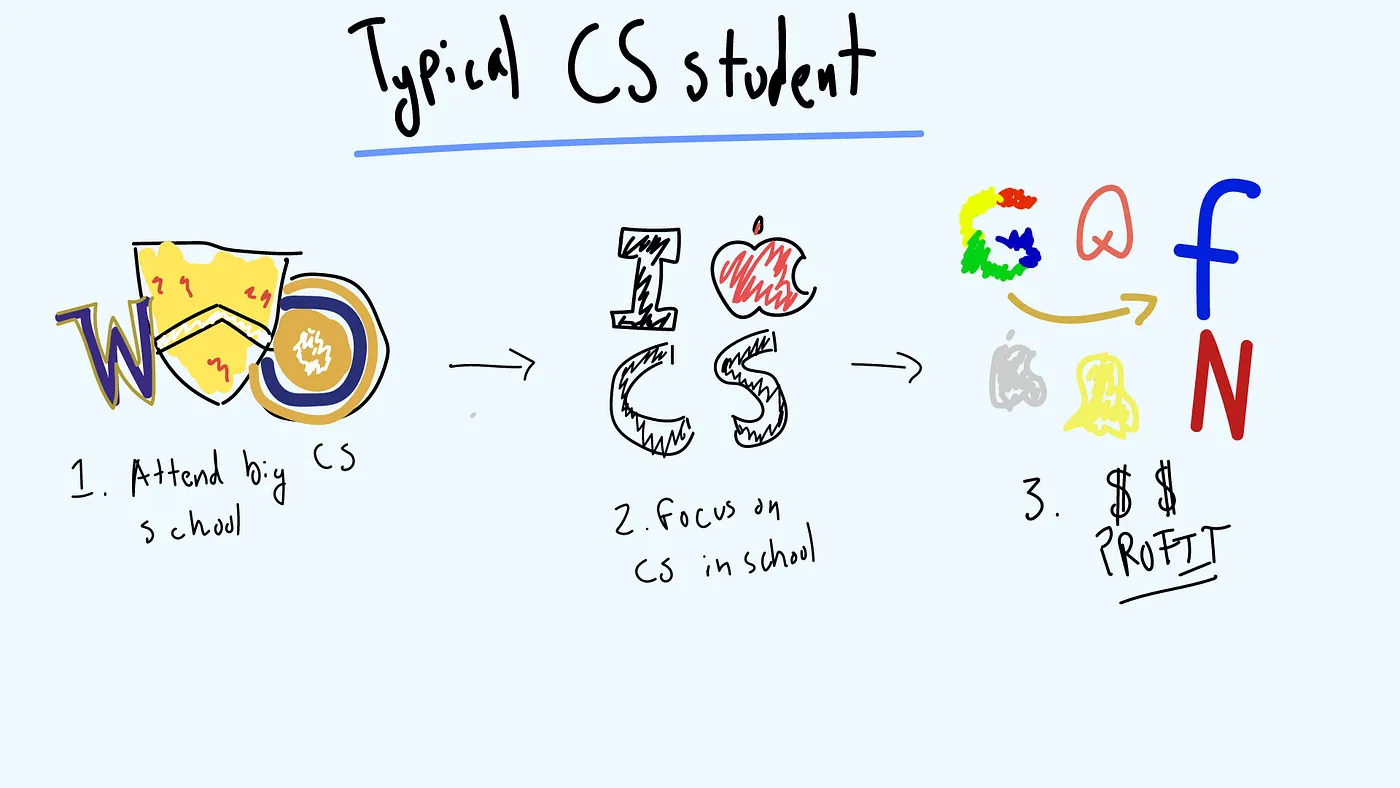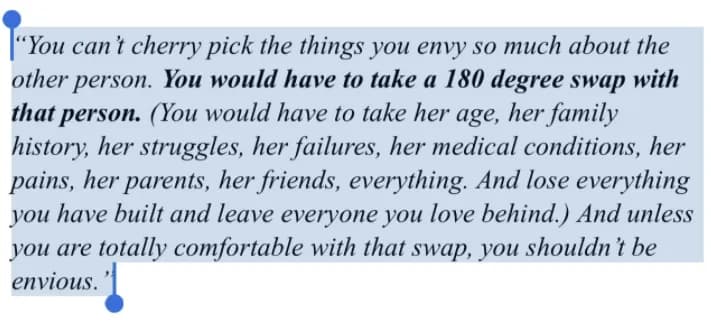
To provide you with some personal context, I am a student at Middlebury College, a small (~2600 students) liberal arts college (LAC) in Vermont. I am currently on a gap year after my second year; however, in my first two years at Middlebury, I concentrated my studies around computer science, art, and economics. I am by declaration a computer science major even though my studies have been equally spread between these three disciplines. I greatly appreciate this "feature" of liberal arts colleges. It's allowed me to explore while still making progress towards my degree. This type of learning environment is not for everyone, but it compliments my strengths.
When I began writing this piece, I was focused on answering the question of whether studying computer science at a liberal arts college is self-sabotage.
If it's not immediately obvious why some may think studying computer science at a liberal arts school is self-sabotage, let's take a quick detour through the very generalized path of typical a computer science student.

- The student attends a large research university that has a large computer science program.
- The student focuses on computer science while taking other general education requirements.
- After graduation, they land a sweet software engineering job at a well paying company and begin to make a "comfortable" income.
In contrast, the typical CS student at a liberal arts school follows this path:
- The student arrives to campus with some hint of what they want to study. They may have coded in high-school or they may be trying a CS class out to explore. Either way, few are 100% sure they want to get a degree in computer science.
- After a couple courses in the department while exploring other fields, they decide they like CS enough to declare it as their major.
- They continue with the CS courses while often doing an equal amount of courses in other departments.
- When it comes time to apply for internships or actual jobs, they're distraught. They have good fundamentals in CS, but they feel unprepared when it comes to technical prowess. This is not a fault of the Computer Science faculty or departments at LAC, but a side-effect of the their holistic studies. Often, it's also a side effect of their myriad passions, i.e. they probably don't code in their free time.
During my gap year, I have spent many hours developing—teaching myself to build web applications—and have I consequently found myself surrounded (virtually) by talented computer science students and professionals. These students tend to be from larger institutions where their "path" is clearer and coursework more focused.
My issues began to arise after I had doubled my focus on coding, during the first few months of my gap year. Combining this personally-uncharacteristic focus with my temporal distance from school, I lost sight of my personal context: my goals and visions that frame decisions and make me uniquely me.
For context, I had only started seriously building my web-development skills six months before, but it had slowly begun to morph into my identity. On top of that, I began to forget that I really, truly, seriously, did not know what I wanted to do with my life or career. In all seriousness, there is little reason for me to know. I'm still in the exploring stages, but as I have put on this facade of suave-software-engineer as my identity, I have slowly rewritten my personal context. For example, I forgot that six-months earlier, I was exploring economics and Spanish at school with no passion or interest in web-development.
The self-criticizing questions were ruthless: "Why didn't I start earlier?", "why was I not making websites in high-school?", "have I been wasting my time?" These questions accompanied a slew of comparisons between myself and my peers from larger institutions, many of whom coded in high-school or attend a high-caliber computer science school.
These comparisons left me discouraged and for the past six months I've been maniacally searching for justification—some well-formed argument that equates me with my peers. I scoured for analogies and research that gave warrant to my path. I built justifications like: "holistic study may be hard to see but can give you better social skills" or "I have learned to look at a problem from different angles."
This research may be correct, the analogies sound, and there may be a fair answer to some of the comparisons with my peers; however, the way I have been using these comparisons to gauge my personal success was flawed. For example, I can say with confidence that many of my peers (from larger institutions) are better developers or artists than me, but this should not diminish the tool-chest I have been constructing and the effort I have put into my personal development.
Lessons I Have Learned
Let's enumerate a few of the lessons I have learned that have helped me lessen the times I compare myself with others.
1. Cherrypicking highlights
It pretty much goes without saying at this point, but most of the my comparisons were ignited by social media. I had never met the people I was comparing myself to. I had carefully and unknowingly constructed my own versions of them, built from a highlight reel of their best tweets and top accomplishments. Attempting to equate myself to these fictitious deities caused me to diminish their very real achievements. I was constructing these identities and them immediately trying to dismantle them.

2. We have complex context
Each person has their own set of complex context. This context is built by the small decisions we have made over our entire lifetime and by the circumstances we cannot control.
Try what has worked for me: take some time now to reflect on your complex context. What has made you who you are? What do you believe in? Who inspires you?
It's pretty easy to come up with answers to these questions. We use our complex context every day to frame and guide the decisions we make. Surprisingly, we often forget just how complex this context is when comparing ourselves to others. I've often found myself over-simplifying this context and forgetting how it affected my journey thus far. Like the self-criticizing questions I mentioned earlier, this over-simplification can have adverse effects.
Additionally, we may forget that others are just as complex. Realizing the presence of this complex context in each person, has helped me improve my interpersonal relationships, be more empathetic, and realize just how impossible it is to compare two people.
Try what has worked for me: next time you're interacting with someone, try not to jump to conclusions, think about their complex context.
Abstracting away this complex context has contributed to a toxicity within the tech industry. Youth is idolized in such a way that it feels like you need to have everything figured out before you graduate middle school or you're already behind. Creating this stigma, constructs difficult barriers for unrepresented groups. Think about a first-gen or low income student who is extremely passionate about computer science, but cannot afford to spend their free time learning web-dev skills because they have to work.
Basing success and value off these comparisons without complex context is like looking at the time to destination without factoring in the distance traveled.
3. You are uniquely you
When I first realized this contradiction, I laughed out loud. It's so freaking obvious, but so hard to remember. Anyways, this is what I realized:
I think most people want to be unique. Most people want to leave some type of legacy that can be uniquely attributed to them. Now to achieve this uniqueness, most people will base their success on comparisons with role models. Perversely, as they improve themselves off these benchmarks, they actually become less unique.
If you're basing your success on comparisons, you're going to lose sight of what makes you, uniquely you. It's as simple as that. Yeah, as if.
There is really no shortage of cliche advice when it comes to comparisons, but this is what has worked for me. I would suggest taking these lessons and think of them next time you notice yourself as the object of a comparison. Simply noting this, can help you realize your triggers and address them.
To get here has been a long journey for me. It's taken me a long time to feel comfortable and grounded enough to write this. For over three years, I have struggled learning these lessons and I have recently started to make progress.
It takes a lot of time and practice, but just remember it's not a race.
If you like this piece and want to chat more, dm me on Twitter!